
In the hoary tradition of Mother Goddess worship, Goddess Maariamman ranks high, both in belief and effect.
The goddess is hailed by different names like Maari amman, Maari aathaa, Maari and Maari aayi and is seen almost in every village of Tamil Nadu. She resides under the neem tree or near an ant-hill. She is often hooded by a five-headed or a sevenheaded snake. She expedites marriages and grants children. More than others, she removes infirmity and disease.
The Tamil term ‘maari’ means ‘rain’. The ancient Tamils personified rain and the effects of rain, namely, coolness and fertility as a beautiful woman and in turn, worshipped her. In as much as a mother feeds her children, rain feeds the world and the soil. Hence, the ancient people looked at ‘rain’ as the Mother who offers fertility and flourish to the soil thereby also making the people of the earth healthy and prosperous. ‘Maari’ – the term for rain, and ‘amman’ – the term for mother, were combined to give the goddess the name ‘Maari amman’.
Why is she a graama devatha of almost every village?
There is an interesting and legendary story about maari amman.
This story is from the May 2020 edition of The Vedanta Kesari.
Start your 7-day Magzter GOLD free trial to access thousands of curated premium stories, and 9,000+ magazines and newspapers.
Already a subscriber ? Sign In
This story is from the May 2020 edition of The Vedanta Kesari.
Start your 7-day Magzter GOLD free trial to access thousands of curated premium stories, and 9,000+ magazines and newspapers.
Already a subscriber? Sign In

Panchakroshi Parikrama of Varanasi
At the snow-capped Kailas, the Divine Lord Shiva was seated with Mother Parvati.

Gadai and the Monks
A fictional narrative based on incidents from the childhood of Sri Ramakrishna.

Chintayo momo maanosho Hori...
Sri Ramakrishna loved songs. There probably was no normal day when he did not sing some songs.

The Vedanta Vaccine
The world is still struggling under the impact of the pandemic due to Covid-19 for the last three years.
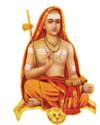
Chandrakirti's Chariot: Self in Madhyamaka Buddhism and Advaita Vedanta
The goal in Advaita Vedanta is the cessation of suffering and the attainment of true fulfillment. Suffering, according to this school, is due to ignorance of the true nature of the self and consequent erroneous identification with the body-mind.

Reminiscences of Sargachhi
Question: यद्यदाचरतत श्रेष्ठसतत्तदरेवरेतरो जनिः। ‘Whatever a superior person does, others do the same thing!’ (Gita 3:21) – What does this statement mean?
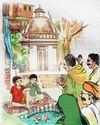
THE AUTUMN FESTIVAL
A fictional narrative based on incidents from the childhood of Sri Ramakrishna.
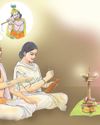
Bards of Guruvayur: Vilwamangalam II
Saints of India
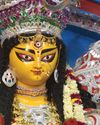
In the Universal Mother’s Divine Playground
Swami Vivekananda never taught the worship of Mother Kali. In a letter to Mary Hale he writes, “Kali worship is not a necessary step in any religion.
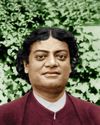
Swami Vivekananda: A Sportsman Par Excellence
In various books and articles, Swami Vivekananda has been called a spiritual leader, a prophet, a patriot, a social reformer, a philosopher, a yogi, a writer, an orator, an educationist, a musician, and so on.